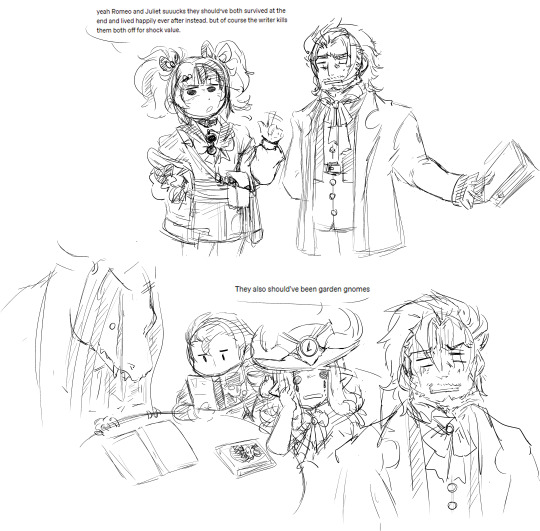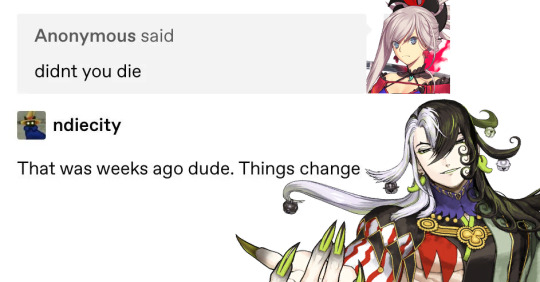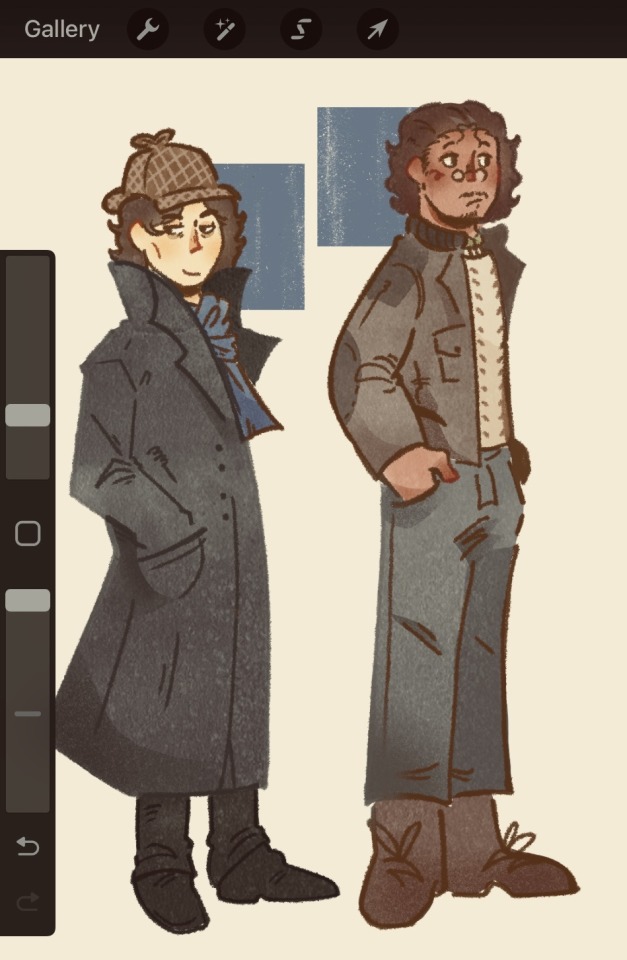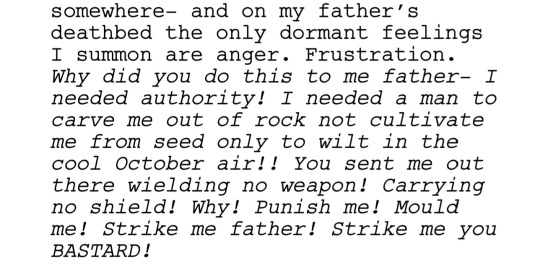#sherlock and shakespeare
Explore tagged Tumblr posts
Text
A Different Kind of Queen of Crime- five ways that Dorothy L Sayers changed the way we see Sherlock Holmes
For my first Holmesian post- a crossover with one of my more usual subjects on my other blog! For when one is talking about Sherlock Holmes, in particular Sherlock Holmes scholarship, there are nor many more pivotal names than Dorothy L Sayers. Sure, Christopher Morley may have had a greater impact on Sherlockian culture, and Richard Lancelyn Green on Holmesian scholarship, to name only a few- but Sayers's contributions to scholarship and "the game" were early and underratedly pivotal.
If you're a Sherlock Holmes fan who is unfamiliar with Sayers's influence, or a Sayers fan who had no idea she had any interest in Holmes, keep reading! (And if you're a Sherlock Holmes fan who wants to know what I think about Sayers, check out her tag on my main blog, @o-uncle-newt. Or, more to the point, just read her fantastic books.)

There's a great compilation of Sayers's writing and lecturing on the topic of Holmes called Sayers on Holmes (published by the Mythopoeic Press in 2001), though some of her essays are also available in her collection Unpopular Opinions, which is where I first encountered them. It's not THAT extensive, and it's from an era in which Sherlock Holmes scholarship, such as it was, was still very much nascent. While a lot may have happened since Sayers was writing and talking about Holmes, she got there early and she made an immediate impact- and here's how:
She helped create and define Sherlockian scholarship: Don't take this from me, take it from the legendary Richard Lancelyn Green! At a joint conference of the Sherlock Holmes Society and Dorothy L Sayers Society, he said that "Dorothy L. Sayers understood better than anyone before her the way of playing the game and her Sherlockian scholarship gave credibility and humor to this intellectual pursuit. Her standing as an authority on the art of detective fiction and as a major practitioner invigorated the scholarship, and her...Holmesian research is the benchmark by which other works are judged. It would be fair to say, as Watson said of Irene Adler, that for Sherlockians she is the woman and that …she 'eclipses and predominates the whole of her sex.'" We'll go into a bit more detail on some specific examples below, but one important one is that, as Green notes, Sayers was not only a mystery writer but an acknowledged authority on mystery fiction, whose (magisterial) introduction to The Omnibus of Crime, a then-groundbreaking history of the genre of mystery fiction, included a highly regarded section on the influence of Holmes on mystery fiction. She was able to write not just literate detective stories but literate critiques of others' stories and the genre (as collected in the excellent volume Taking Detective Stories Seriously), and as such, the writing she did on Holmes was well received.
She cofounded the (original iteration of) the Sherlock Holmes Society of London: While the current iteration of the Society lists itself as having been founded in 1951, a previous iteration existed through the 1930s, founded as a response to the creation of the Baker Street Irregulars in New York and run by a similar concept- the meeting of Sherlock Holmes fans every so often for dinner at a restaurant. Sayers, who seems to have been much more clubbable than Mycroft Holmes, helped run the Detection Club on corresponding lines as well. (Fun fact, Sir Arthur Conan Doyle was invited to be the first president of the Detection Club! However, he refused on grounds of poor health and, either right before or right after he died, the Detection Club met for the first time with GK Chesterton as president.) While the 1930s society didn't last, and Sayers didn't decide to join the newly reconstituted club in 1951, her presence from the beginning was key to the establishment of Holmesian scholarship.
She helped define The Game: Sayers didn't invent The Game, as the use of Higher Criticism in the study of Sherlock Holmes came to be called. (The Game now often refers to something a bit broader than that, but it's a pretty solid working definition to say that it is the study of Holmes stories as though they took place in, and can be reconciled with, our world.) Her friend Father Ronald Knox largely invented it almost by accident- as Sayers described it, he wrote that first essay "with the aim of showing that, by those methods [Higher Criticism], one could disintegrate a modern classic as speciously as a certain school of critics have endeavoured to disintegrate the Bible." This exercise backfired, as instead of finding this analysis of Holmes stories silly, people found it compelling and engaging- and this style of Sherlockian writing lives on to this day in multiple journals. Sayers, with her interest in religious scholarship as well as Holmes, was well equipped to both understand Knox's original motivations as well as to carry on in the spirit in which further Game players would take his work, as we'll see. She also wrote the line that would come to define the tone used in The Game- that it "must be played as solemnly as a county cricket match at Lord's; the slightest touch of extravagance or burlesque ruins the atmosphere." While comedic takes on The Game would never vanish, her establishment of tone has lingered, and pretty much any in-depth explanation of The Game will include her insightful comment.
Some of Sayers's ideas became definitional: Here's a question- what's John Watson's middle name? If you said "Hamish," guess what- you should be thanking Dorothy L Sayers. (When this middle name was used for Watson in the BBC Sherlock episode The Sign of Three, articles explaining its use generally didn't bother to credit her, instead saying that "some believe" or a variation on that.) She was the one who speculated that the reason why a) Watson's middle initial is H and b) Mary Morstan Watson calls Watson "James" instead of "John" in one story is because Watson's middle name is Hamish, a Scottish variant of James, with Mary's use of James being an intimate pet name based on this nickname. It's as credible as any other explanation for that question, but more than that it became by far the most popular middle name for Watson used in fan media. Others of Sayers's ideas include that Watson only ever married twice, with his comments about experience with women over four continents being just a lot of bluster and him really being a faithful romantic who married the first woman he really fell for (the aim of this essay being to demolish HW Bell's theory of a marriage to an unknown woman between Mary Morstan and the unnamed woman Watson married in 1903, mentioned by Holmes in The Blanched Soldier); that Holmes attended Sidney Sussex College, Cambridge (she denied that he could have attended Oxford, having gone there herself- fascinatingly, Holmesians who went to Cambridge usually assert that he attended Oxford! Conan Doyle of course attended neither school); and reconciling dates in canon (making the case that one cannot base a claim for Watson's mixing up on dates on poor handwriting as demonstrated in canonical documents, as it is clear from the similarity of different handwriting samples from different people/stories that they were written, presumably transcribed for publication purposes, by a copyist).
She wrote one of the only good Holmes pastiches: Okay, fine, I'm unusually anti-pastiche, and genuinely do like very few of them, but this is one that I love- and even more than that, it's even a Wimsey crossover! On January 8 1954, to commemorate the occasion of Holmes's 100th birthday (because, of course, he was born on January 6 1854- Sayers was more in favor of an 1853 birthdate but thought 1854 was acceptable), the BBC commissioned a bunch of pieces for the radio, including one by Sayers. You can read it here (with thanks to @copperbadge for posting it, it's shockingly hard to find online), and I think you'll agree it's adorable. The idea of Holmes and Wimsey living in the same world is wonderful, the way she makes it work is impeccable, and it's clearly done with so much love. Also you get baby Peter, which is just incredibly sweet!
I got into Dorothy L Sayers, in the long run, because I loved Sherlock Holmes from childhood and that later launched me into early and golden age mysteries- but it was discovering Sayers that brought me back full force into the world of Holmes. Just an awesome lady.
#hm holmes quotes from shakespeare's twelfth night a lot#he must have an affinity for the play.#sherlock holmes#john watson#john hamish watson#holmes#acd holmes#sherlock holmes canon#sherlockiana#the game#watsonian#biblical higher criticism#dorothy l sayers#lord peter wimsey#ronald knox#sayers on holmes#so why was sherlock holmes born on january 6?#if you think you know why#no it's stupider than that#so this guy christopher morley who basically invented sherlockian scholarly fandom#as in he started the baker street irregulars which is the org from which pretty much all other scholarly fan societies got inspiration#was like “hm”#“holmes sure does quote from twelfth night a lot”#“he must have an affinity for the play.”#“and why would he have an affinity for the play? because the twelfth night (jan 6) is his birthday.”#and so it has remained ever since#making clear the advantages of being first
228 notes
·
View notes
Text
Whilst we’re taking Holmes and Watson into different time periods, instead of taking him to the modern day, why don’t we do a complete u turn me take him back in time, pre-Victorian era?
Holmes and Watson in the Elizabethan times and watching Shakespeare’s newest play after solving a murder.
Holmes and Watson running around during the witch trials, trying to disprove all of the witch allegations (then running away when Holmes gets accused of being a witch after deducting the witch finder’s entire life).
Holmes and Watson discovering the wheel. Because why not.
I don’t know, I have many ideas which don’t make sense but do with this what you will.
#they would LOVE seeing Shakespeare live#sherlock holmes#sherlock#acd#acd canon#sherlockholmes#john watson
468 notes
·
View notes
Text
I like a very specific kind of character
They need to be sad and suicidal, insanely smart, misunderstood by all people, fuckin dRAMATIC, and have this very close homoerotic relationship with their one (1) and only friend, who is calm and appears ordinary
...alright I just like Hamlet and Sherlock Holmes.
#hamlet#tragic danish boyfriends#horatio#shakespeare#william shakespeare#sherlock holmes#bbc sherlock#johnlock
154 notes
·
View notes
Text

chaldea's book club has strong opinions on shakespeare's reading recommendation
source for text: x
135 notes
·
View notes
Text








A collection of my FGO shitposts
#som.txt#fgo#kiyohime#shakespeare#voyager#ozymandias#sherlock holmes#medb#cu chulainn#jalter#jeanne d'arc#ashiya douman#miyamoto musashi#hans christian andersen#thomas edison#utsumi erice
714 notes
·
View notes
Text

look at my detective dawgggg he ain’t solving his father’s murder 😫🤯🤣 (hamlet x bbc sherlock)
#hamlet#bbc sherlock#horatio#watson#sherlock holmes#is this a crossover ?? yes#is there more to come ?? perchance#just wanted to test out my new style#art#digital art#drawing#artists on tumblr#shakespeare
36 notes
·
View notes
Text

I'm sorry but Dan's outburst at his father really sounds like it should be part of some Shakespearean tragedy. Look at it!
(he really would've made an Amazing actor oh my god)
#like I'm not that well versed in shakespeare i only read hamlet & Macbeth and seen ... r&j.. and three comedies..? i think#but#am i wrong??#sherlock & co#sherlock and co#a scandal in bohemia#part 2
35 notes
·
View notes
Text
Jeremy Brett as Macbeth

~Full stage production - 1981 ~
🔥 🔥 🔥 The most snogging I've ever seen in a play - EVER!
-=<+>=-
@amypihcs @blistering-typhoons @calaisreno @helloliriels @totallysilvergirl
#I hope you like this!#Friday 411#snogging warning#Sherlock#Sherlock Holmes#Granada Holmes#Sherlock Holmes Granada#Jeremy Brett#beautiful man#unnecessary handsome#Macbeth#shakespeare
81 notes
·
View notes
Text
So you're telling me that Arthur Morgan could have read Sherlock Holmes back in in 1887
#why did this only occur to me now#arthur has read shakespeare so it isn't too far fetched to think that he could have read sherlock holmes#he would have eaten that shit UP#mick squeaks#rdr2#red dead redemption 2#arthur morgan#mick thinks#sherlock holmes
109 notes
·
View notes
Text

@w0lfinsheepscl0thing Yes we can! It's a drawing from my website!

How many literary cats can you recognise?
#artists on tumblr#Writing a very very long tag so that the tags that would give away answers won't be visible at once#Booklr#cats of tumblr#Cats#Art#Good omens#Sherlock Holmes#Frankenstein#Mary Shelley#shakespeare
37 notes
·
View notes
Text
Today in 'harrassing the innocent staff of the National Theatre' they continue to be very nice to me, and I've been informed that you can just GO TO THEIR ARCHIVE and WATCH THEIR RECORDINGS of things! How great is that!?
I mean I can't because I'm housebound and most of you lot seem to live outside of the UK and trains to London are expensive if you aren't, but were I in a position to I would ABSOLUTELY be looking at cheap weekday coach tickets and messaging the friend whose sofa I have traditionally slept on down there.
What I did was email and ask how I might access a recording of the 2015 production of Hamlet in which Benedict Cumberbatch starred opposite Sian Brookes - his future secret sister. Without buying a DVD from America I might add. And a less troublesome external DVD player.
The first person I contacted passed me on to the archive lot with a comment that yes BC is really quite the asset to the National Theatre and wishing me luck. I absolutely expected the archive team to tell me that you can't just watch whatever production you want whenever you want because a decade after its performance you decide you like one of the actors in it, for free or for cheap. But apparently you can, down at the archive.
Wonderful.
#national theatre at home#national theatre#london#drama#theatre#streaming#benedict cumberbatch#bbc sherlock#chronically ill#chronic illness#housebound#bed bound#sherlock holmes#sherlock fandom#me cfs#cfs/me#cfs#potsie#pots#postviral#pots syndrome#chronic fatigue#chronic fatigue syndrome#shakespeare#william shakespeare#hamlet#sian brooke#ophelia#literature#cumberbitches
25 notes
·
View notes
Text
One thing about me that I very rarely mention on this blog (surprisingly) is the only other thing that can possibly match my obsession with the Holmes stories are the Shakespeare plays- literally my brain jumps between which I'm currently constantly thinking about. Sometimes (like now) they manage to blend together, so when I reread Hamlet, the final scene, particularly, these lines:
"Horatio...report me and my cause aright To the unsatisfied."
and
"And in this harsh world draw thy breath in pain To tell my story."
Remind me of a certain detective/chronicler duo... one who could be misunderstood so the person who tells their story must do so correctly... one character dealing with morality issues, the other almost dangerously loyal with potential homoerotic undertones... am I making sense?
ACD wasn't one to shy away from Shakespearean connections (journeys end in lovers' meeting, anyone?) and honestly, it would be very difficult to write so many stories and avoid one the Bard hadn't told before. So am I taking too much of a leap to suggest that ACD might have taken elements (few but some) of Hamlet and Horatio's relationship for Holmes and Watson's, or even Hamlet's character for Sherlock Holmes? Hamlet's erraticity (is that a word?), but logical pondering, and his humour... it's a stretch but it's fun to entertain the idea.
#Holmes read Hamlet and felt understood#I imagine#Hamlet is Holmes' blorbo pass it on#i could have written a more cohesive analysis on this but anyway#sherlockholmes#acd#acd canon#john watson#sherlock holmes#sherlock#hamlet#william shakespeare#shakespeare
23 notes
·
View notes
Text
Does anyone on this entire planet still think about Gnomeo and Juliet as much as I do? Did they ever?
#gnomeo and juliet#romeo and juliet#shakespeare#Elton John produced it?#wtf why is ozzy Osborne in this movie?#how much cocaine and/or blackmail was involved in the production of this animated feature#this cast list is going to give me an aneurysm#don’t get me started on the sequel and Sherlock Holmes in the 2010s public imaginary#why is the frog that way?#WHY IS THE FROG THAT WAY
44 notes
·
View notes
Text
so. sherlock and co has already been adapting stories from after sherlock returns from the dead, in the timeline of publication of original stories. which makes me realize the possibility that the show might END somewhere around the final problem (or they will do some sort of seasonal divide, perhaps).
but my goodness imagine getting through all other 60 or so (depending on what, exactly, they decide to go into) stories, at least over 100 episodes at that point, and realizing the final problem is all that's left to adapt. I don't have many thoughts about this podcast, beyond casually enjoying it as a longtime fan of the original Holmes and Watson stories, but DAMN it would hit me hard if they had some sort of ending with Holmes' death.
I would actually be really into the show seeming completely done with the final problem and then, perhaps a few months or a year later, getting some sort of epilogue or resolution focusing on Holmes' return. I don't exactly think this will happen, but damn am I curious about if, when, and how they will adapt Sherlock's death.
on another note, I also am deeply curious about how their moriarty will turn out, but that is neither here nor there
#sherlock and co#sherlock & co#sherlock holmes#john watson#ramblings#this post says very little but takes up a lot of space#sorry to all my mutuals watching me get reobsessed with detective media :(#this has been my secret special interest lurking under the surface for a while#aside from shakespeare#but i needed a break from that for a bit#please talk to me about sherlock and co i know NO ONE else who has heard of this podcast and it is currently a deep nerd interest of mine
73 notes
·
View notes
Text
Time Travel Question 70: Assorted Performances IX
These Questions are the result of suggestions from the previous iteration.
Please add new suggestions below if you have them for future consideration.
#Time Travel#Concerts#Performances#Theater History#Queer History#20th Century#19th Century#Shakespeare#Sarah Bernhardt#Hamlet#Mae West#Sex 1926#Broadway#1926#Women in History#1971#Grease#Chicago#Musicals#Toronto#Camelot#Basil Rathbone#Romeo and Juliet#Sir John Martin-Harvey#Sydney Carton#The Only Way#Jeremy Brett#Edward Hardwicke#The Secret of Sherlock Holmes#1988
40 notes
·
View notes
Text
The place was pitch-dark, but it was evident to me that it was an empty house. Our feet creaked and crackled over the bare planking, and my outstretched hand touched a wall from which the paper was hanging in ribbons. Holmes's cold, thin fingers closed round my wrist and led me forwards down a long hall, until I dimly saw the murky fanlight over the door. Here Holmes turned suddenly to the right, and we found ourselves in a large, square, empty room, heavily shadowed in the cor-ners, but faintly lit in the centre from the lights of the street beyond. There was no lamp near and the window was thick with dust, so that we could only just discern each other's figures within. My companion put his hand upon my shoulder and his lips close to my ear.
"Do you know where we are?" he whispered
"Surely that is Baker Street," I answered, staring through the dim window.
"Exactly.
We are in Camden House, which stands opposite to our own old quarters."
"But why are we here?"
"Because it commands so excellent a view of that picturesque pile. Might I trouble you, my dear Watson, to draw a little nearer to the window, taking every precaution not to show yourself, and then to look up at our old rooms-the starting-point of so many of our little adventures? We will see if my three years of absence have entirely taken away my power to surprise you."
I crept forward and looked across at the familiar window. As my eyes fell upon it I gave a gasp and a cry of amazement. The blind was down and a strong light was burning in the room. The shadow of a man who was seated in a chair within was thrown in hard, black outline upon the luminous screen of the window. There was no mistaking the poise of the head, the squareness of the shoulders, the sharpness of the features. The face was turned half-round, and the effect was that of one of those black silhouettes which our grandparents loved to frame. It was a perfect reproduction of Holmes. So amazed was I that I threw out my hand to make sure that the man himself was standing beside me.
He was quivering with silent laughter.
"Well?" said he.
"Good heavens!" I cried. "It is marvellous."
"I trust that age doth not wither nor custom stale my infinite variety," said he, and I recognised in his voice the joy and pride which the artist takes in his own creation. "It really is rather like me, is it not?"
"I should be prepared to swear that it was you."
— The Adventure of the Empty House
#i just love this little passage and Holmes’s Shakespeare quote#holmes x watson#they are cute#sherlock holmes#acd holmes#arthur conan doyle#sh quotes
49 notes
·
View notes